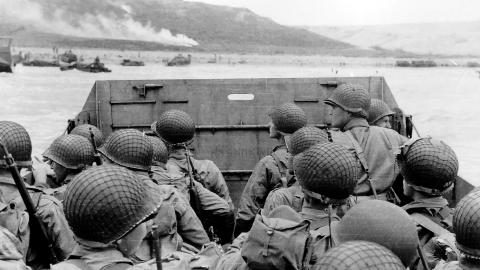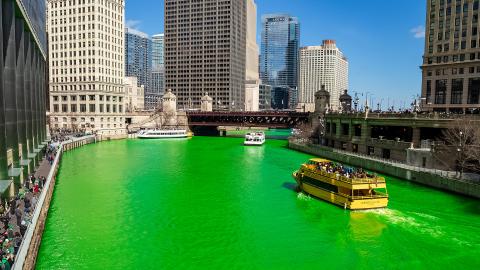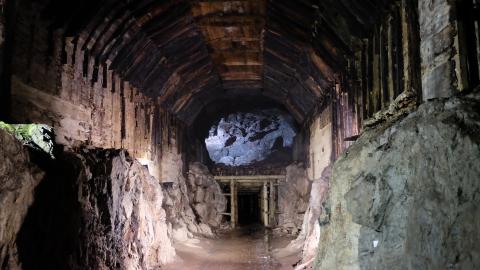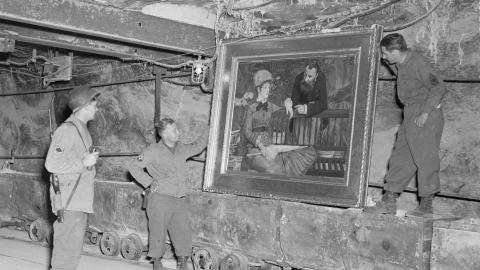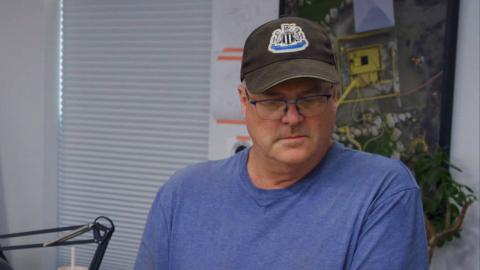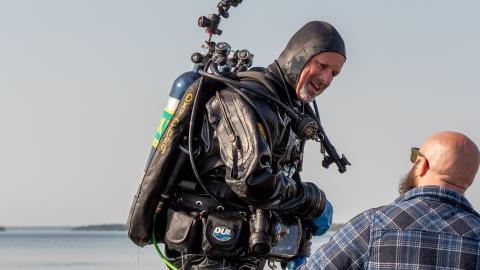
'It'd be very easy to just vanish': Megan Hine on hunting for the lost city of Akakor
'Curse of the Lost Amazon Gold' follows Megan and five other investigators on their epic, expedition into the Amazon jungle on the hunt for the legendary lost cities of Akakor and Akahim
Megan Hine was described by Bear Grylls as: 'tougher than 99% of the men I know'
Survival expert Megan Hine on her expedition into the Amazon, searching for the lost cities of Akakor and Akahim and her advice for surviving alone in the Amazon jungle.
Megan Hine is a British survival expert and has worked behind the scenes around the world, keeping celebrities safe in the wild. Described by Bear Grylls as: 'tougher than 99% of the men I know', Megan has worked and lived with remote native communities including the San bushmen in Africa, the Sami reindeer herders in the Arctic and the Iban jungle-dwellers in Borneo.
Curse of the Lost Amazon Gold follows Megan and five other investigators on their epic, expedition into the Amazon jungle on the hunt for the legendary lost cities of Akakor and Akahim and their quest to discover what happened to previous explorers who went in search of them and never came back.
Why did you want to get involved in the series?
The lost city of Akakor was first discussed in a book, The Chronicle of Akakor which is just the most insane read. As somebody who's always been into adventure and exploration and pushing boundaries when I read this book, all my childhood dreams came true.
What did you enjoy most about taking part in the series?
I was so fortunate to be teamed up with five other investigators who are all at the top of their game in their respective fields. I work in TV and so I'm so used to the highly produced casting procedures, so I wasn't quite sure what to expect. But when I turned up, I met this team of real badass, authentic people and we all got on so well. I've made lifelong friends off the back of it, which I wasn't expecting at all.
Also, I work a lot in jungle areas and I have worked in the Amazon in the past. So, I liked going back to those remote areas because that's where I thrive.
As a survivalist, what's particularly challenging about the South American environment?
I've been fortunate that my career as I started in the mountains, with mountain guiding and then over the years diversified into all these different environments and I've spent a lot of time in jungles over the past decade.
I've got a healthy respect for that environment and I've got a love-hate relationship with it because it's so harsh. You really have to have to look after yourself. Taking care of yourself is key because within a few days of genuinely living out there in the jungle, your feet, literally start rotting.
You've got deadly snakes, you've got exposure to the environment, as well as very wet, humid environments, you've got issues with flash flooding, which is something that we experienced, as well as wildlife threats and the threat of the humans in any area as well.
How did you go about preparing for The Curse of the Lost Amazon Gold?
It's the same process for any expedition that I set up which is to make sure that I build - as much as possible - a safety net underneath. No expedition, no trip ever goes exactly as planned. But at least with a safety net, you know who to contact, how to get people out of there and you've got the right medical supplies and safety kits so you'll be able to deal with as many eventualities as possible.
You follow in the footsteps of three expeditions that went looking for Akakor in the 1980s. It must have been much more difficult back then...
I have a huge amount of respect for them particularly when it comes to communications. Where we were working, there was no phone signal. I've got satellite communications with the outside world. So, I know that if something goes wrong, we might not get help to us within 48 hours but at least at some point, hopefully, somebody will turn up and help us.
Back in the 1980s, they've read this book, and it’s captured their imagination and they've gone off on this journey to go and look for these lost cities. It just blows my mind. I think it's just amazing and sometimes I wonder if I was born a little bit too late to be able to just go off with no communication with anybody. It would be quite amazing.
Were you ever in any personal danger during the expedition?
I was going down this 1000ft waterfall and trying to see the entrance to a cave. Rappelling down that with fixed ropes in water is so dangerous because if you get stuck in the current, you're pretty screwed.
As I'm going down, I had to judge it, the moment where the wind was quite steady. But as I was about halfway down the wind changed direction and started circulating and suddenly tonnes of water were cascading onto me. That was a super sketchy situation to be in because if the wind kept pushing the water onto me, I don't know how I would be able to come back up again or go down. Suddenly I felt very tiny and insignificant.
There is an inherent risk in these environments but you've got the human element as well. At times, we had armed guards on the boats, because there's a lot of piracy going on in these areas. People go missing. There are 'uncontacted tribes' who don't want you there. It'd be very easy to just vanish.
What's one piece of advice you would give someone if they found themselves stranded in the South American jungle?
Stay calm. If you suddenly find yourself in a survival situation, the fight-flight-freeze, stress response is often triggered. This means you’re acting from a place of irrationality, using the more animal and primal part of the brain, which is designed for survival and protection. You want to get back into the sort of the more logical reasoning part of the brain, which is more of like the human brain That's important.
This goes for anyone because I know there's a lot of people getting out this summer into the hills of the UK. And so, if you find that you're geographically embarrassed, then just stop still in that position where you are. Take five because if you're stopped at that moment, chances are, you're not that far from a path.
I always use the acronym STOP. Stop. Think. Observe. Plan. So, I'm stopping, I'm thinking about the situation I'm in. I'm observing. What have I got on me? If I have a rucksack what have I got in that? What have I got in my pockets? Is there a way that I can meet my basic priorities?
In the jungle, because it's such a humid environment, your priority is going to be water and to stay hydrated. But then there's a lot of water because it's very wet with lots of rivers. So, you can keep yourself hydrated. Then the priority becomes shelter. As crazy as it sounds, it's very easy, - particularly at night- to develop hypothermia. If you're not eating and your energy's down, it's very easy to kind of succumb to the environment.
Once you have observed what you have, then you need to plan. What am I going to do? I'm in this situation, what's my plan? How do I get myself out of here? How do I better the situation that I'm in?
You have previously worked and lived with Sami Reindeer herders in the Arctic. How does the frozen north of Sweden compare to the humid and equally treacherous Amazon Rainforest?
Each environment has got its challenges. This is what I've loved about the work that I've done over the years is because it's diverse in terms of the environments that I've experienced in. I've worked in jungles and deserts and mountains and these Arctic conditions. And for each one, you have to know how to look after yourself in each environment.
Jungles are hot and humid. So, you're trying to avoid things like foot rot and being bitten by insects. In the Arctic when it's really cold, it's all about layering, and not building up sweat in your layers. Whereas in the jungle, sweating helps calm you down. So, it's kind of understanding how each of these environments works. And knowing, what the pros and cons are, and how each environment has its own dangers. In its way, the Arctic can be just as dangerous as the jungle if you don't know what you're doing.
What is it about these two lost cities of Akakor and Akahim that drives individuals from all over the world to travel deep into the Amazon at great personal risk?
I think there's like there's an inherent need in all of us for answers and adventure and excitement. I think this is why people like adventure and survival shows do so much.
That's because the way we live now is not how we evolved to live. We’re still kind of stuck in our caveman mindset. The need for adventure, the need for experiencing fear and risk, is inherent within us. I think this is why we have quite a lot of issues with anxiety, depression, and obesity because it can all be linked back to our ancestral roots, and how we used to live. I think it's just that draw to adventure and that kind of excitement that explains people's motivations. It's fascinating from a psychological perspective.



